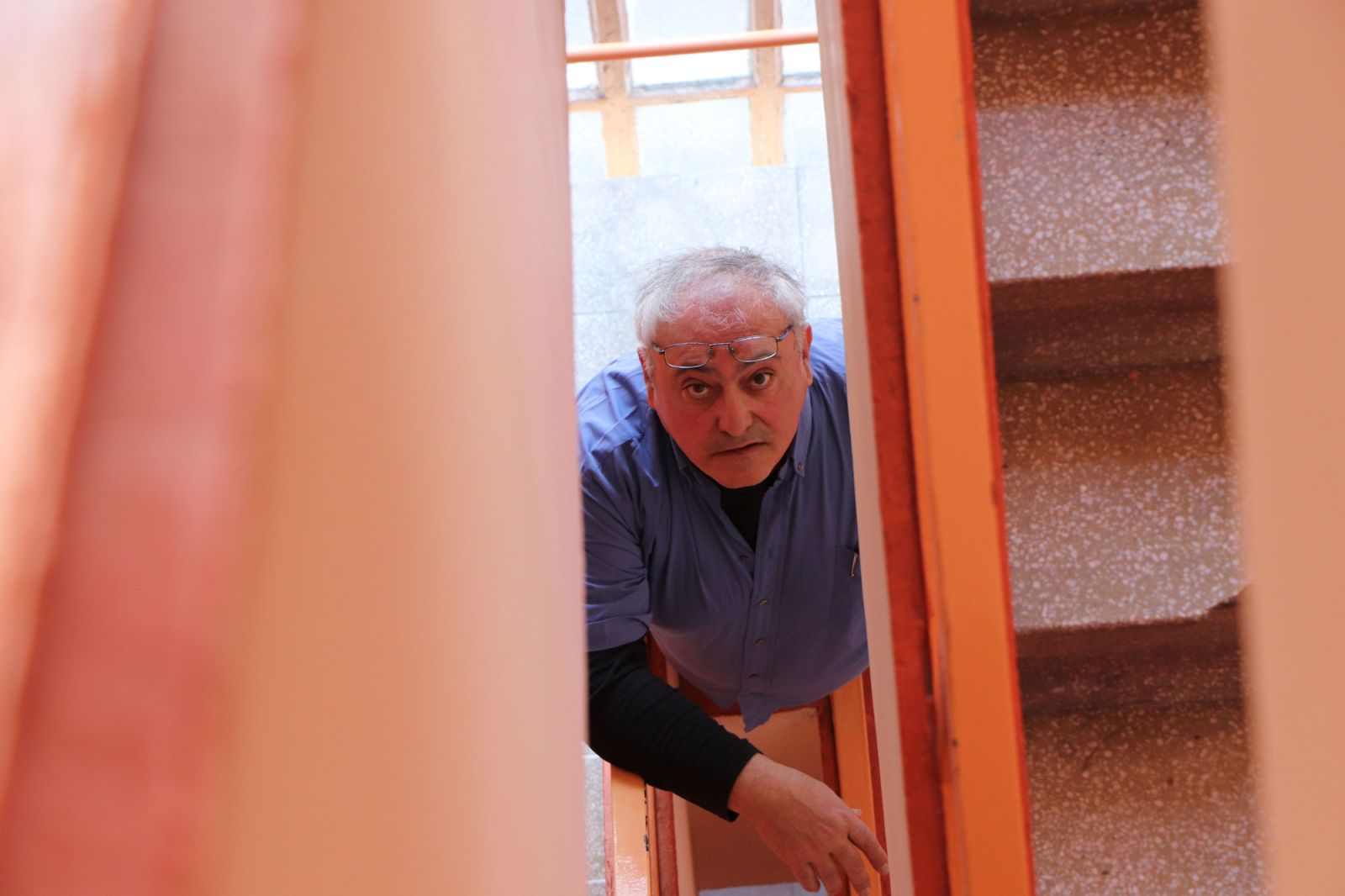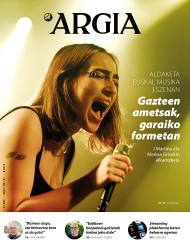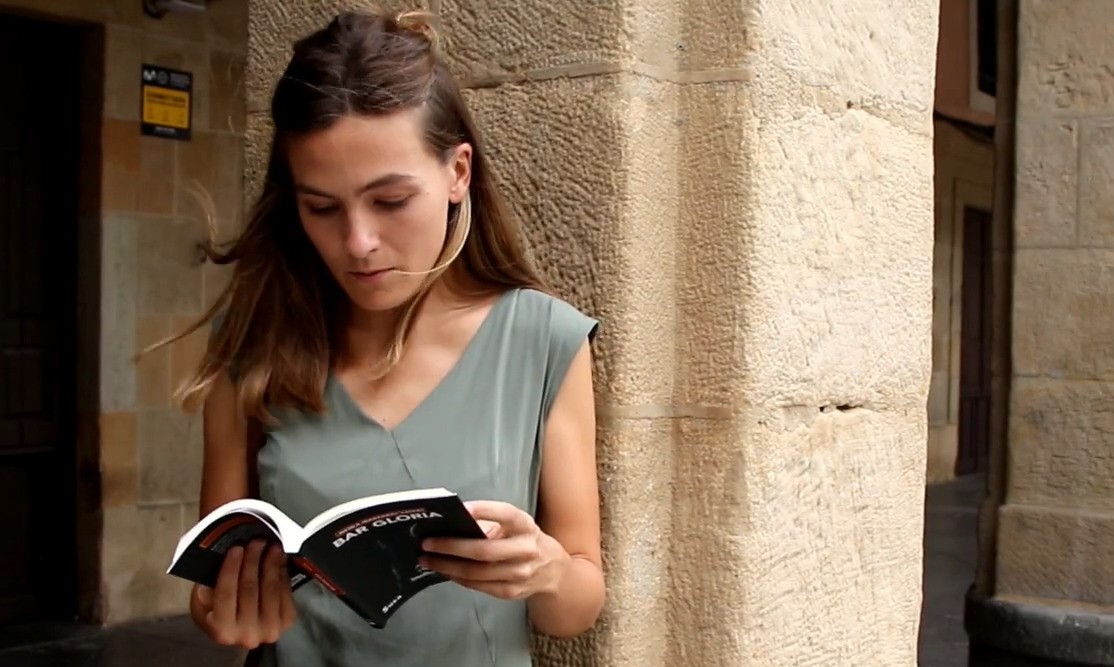"We have survived and survival itself is not a little bit"
- Jon Arano is one in our literature. At one time it was tireless to write poems, edit poems of Eustakio Mendizabal Txikia and others, Ostiela! publish the sound and other magazines, collaborate in the press and radio, and always read. However, years have passed away from the main square and the major outbreaks. He has still posted the story in Booktegi.eus and we've gone.

Jon Mikel Arano Aramendi. Itsasondo, 1961
Journalist, poet... His works are disseminated in many media: Zeruko Argia, ARGIA, Egin, El Diario Vasco, Gara, Egunkaria, Berria… He made a literary program in quotation marks in Herri Irratia and participated in the creation of Kantillape and Goierritarra. Along with poetry, Ostiela! Jon Arano magazine received the first pornographic magazine in Basque: Pornolore, fur handbook. It contains books of poems Bilete gabe, Malezia collection, and Zeruak eta ifrentzuak, edited by himself. Book Eustakio Mendizabal Txikiaren Olerkiak.
We have not known their work for some time. Want to play Russian rubs? We've read you a long story online... Last
year, I was a little bit in Usurbil's healing -- others call him sedantry -- I had time, and that narrative came to my head. It is the adaptation of a text “found” in the cure, after all with notes from the unknown person who found the text in a cockroach nest. It is also a narrative based on experiences of youth, a long story. Of course, I found the text in the cure and all of that is a literary, classic license, widely used to disguise the writer's biography and to make fiction. In these cases, if anyone knows, nobody else knows what they really have and what they have invented. I've cooked up the idea, written, combed, taken advantage of the contributions of some friends and published the story. I am pleased.
the Spanish Civil War of 1936, the Fall of Bilbao, the entry of Officer Paco Echevarria into the French Foreign Legion and his destiny to Algeria. In addition, Arthur C will be one of his informers. K.
legionary… And that legionary tells everything. The scenario is Algerian guerrilla warfare or more than the scenario, but the narration is ruled by the protagonists’ vivid ones. Echevarria, for example, is from gudaris. They have lost the Spanish Civil War, but he has not surrendered. He has had to enter the French Foreign Legion and surrender it to Indochina as well. During the Algerian war, he discovers that there too he will lose the war, but he does not want to give up, and instead of giving up, he plays the Russian rubles: he will play life. He's not playing for money, not too long, he's playing life against himself. He intends to settle the accounts against several major betrayals…
We have read most of the work done so far on paper. This narrative has been installed on the Booktegi website, without paper support. I
have published it on the Internet, yes, and it has been a surprising welcome. Booktegi has used her network and, on the other hand, I have tried to disseminate this narrative among my friends, in case we live, Whatsappez and by e-mail, but the numbers do not come from there, from mouth to mouth, to which Russian roulette? Two months after its publication in early March, it has had over 1,200 readings and downloads. And after the interviews I've conducted, I think you'll have more readers. Success, right? And don't flush, because many times we've been like this, we don't know which readers we have. As for paper editing, I still have work to publish: poetry, stories, dialogue book, essay, novel… Time will tell what comes and how.

"I haven't been working, but some people think we're few: it calls us just for free time jobs."
He did not speak of translations, but reading Joseba Sarrionandia at the end of the candidatures of Havana we know that he also brings to the Basque Country the book of Javier Arzuaga, former chaplain of Che Guevara: Midnight in pain.
Five years ago, a acquaintance asked me to translate that work from Arzuaga into Euskera. Among other things, I started coming back in Midnight stimulated by Joseba Sarrionandia. You know, [ARGIA, 2010, November 7] Javier Arzuaga, Franciscan fraile in Cuba, at the time of his revolution in Havana, dedicated the first months of the revolution to helping the shot to the wall [ARGIA, November 7, 2010]. After a few years he wrote a hard book of testimonials, At midnight (At midnight) [Seeds in Time, 2016], which he translated five years ago. I hope you will publish it this year. It has been hard work, I wanted to make a readable version, and that too has cost me a lot. On the other hand, the book is big, not thick, but intense, hard and beautiful.
Your name and time to be, Ostiela! associated with the journal. That is where he took his first steps.
We were in 1996! But before we started working. In 1989 we created Goierritarra, when we were joyful and brave, young or green. Ostiela! Came later, and by then we were almost quarantined, we began to lose grace. We have been 60 years old, our former colleague Iñaki Segurola has also died, and we make less smiles, like most people of our age…
It has a long history in the media: In Zeruko Argia… The
first poems were published there, I signed the aliases…
Also. He was saying he's been in the media of each other, and the list is not small. ARGIA, Goierritarra, the Additional Monday A ze de Egin, the literary magazine Susa, the Zabalik supplement of El Diario Vasco, the program Komatxo artean… In addition to your creations.
I've made a long journey, abrupt, full of anecdotes. If we were to make an intrigue of different stories!... We had a good time, with little happy, peeled and alternative money, but over the years it has not been profitable for me. I will tell you: Ostiela! And then I thought that I would start going down the path of the professional writer and that it was going to be possible. They received orders that sometimes could not be fulfilled, sometimes badly paid. I wanted to work, go to a company that does translations and sign up for freelancers.
They said it in many places --
you know. And I said to them, “Become autonomous? But how will I become autonomous if I don’t get the money to pay the fee?” Maybe I was wrong not to give my name in self-employed, maybe not. That was to be a fake autonomous, when no one knew what that was, or when no one said anything about it. I was also lucky because I sometimes got paid custom jobs. So we did almost 20 years, and what are we going to do?
Custom jobs, sometimes well paid, others not. I
have done what I could! I've done some work that I like on request, and I've been there and here as well as journalism, and I've also thought about journalism, but that, as I say, is not what we need to do. I do not believe that the journalist can live long from his profession, dignified and prosperous. In my case, I have been dragging for decades, one writer, another writer, always writing, but I have done nothing but survive, without great experiences. When I was a kid, it was a lot of fun, in ARGIA, in Susa, when I learned to be a journalist there and here. At first it was fun. Then you get the tragedies. I'm going to be a 20th-century man, the sky above, down the earth, I don't regret, I don't like it.
"In my case, I've been dragging for decades, a writer, another writer, always writing, but I've done nothing but survive, without great experiences."
No regret, no satisfaction...
No. We have several achievements. We will continue to work! [Anjel] I managed to interview Monsignor Sukia, through his family, and J.J. We published along with that of Petronor in ARGIA [2007, nº 1303. ]. I also worked 6,000 pages of Sukia to interview me: Pastoral works and writings (pastoral works and writings). Of course, I did not read everything, but I did study it well, and I remember that in the excuse of his stay in Galicia he referred to Rosalia de Castro, or This by Primo Levi is a man who also speaks about the work. I mean, Sukia was very smart. He also wrote in Basque.
What did Anjel Sukia write in Basque?
Poetry! He received an honorary mention at the Olerti Eguna in 1936, in Lekeitio, with the work The Basque seminarist. In Goierritarra I would also write something about Sukiaz. And then, when he died, I also wrote for the newspaper, and in the Sunday supplement I was published with the writing, which also gave him the cover, and I didn't collect everything I believed, after over fifteen days of writing. And then I had to start doing other jobs, and I've been like I've been for these years. I also received a scholarship…
Talk about the literary scholarship Joseba Jaka: In 2007 he published the book of poems Zeruak eta ifrentzuak.
Yes, that too, but when I said about the scholarship, I was talking about the scholarship from the City of Itsasondo, about the scholarship to collect and write the history of the mines there, or the slates, and the entire hometown. It was a one-year scholarship, but I also worked a year and a half. However, I had a job that had started 20 years before and that I continued after. I interviewed over a hundred people, but in the end there was my job.
.jpg)
"After 'Ostiela!', I thought I would begin to walk the path of the professional writer and that I could do it"
Where was it? What do you mean? That the
work was given to a company in charge of the heritage and that something was completed. They mention my name there, but nothing else. I believe that the past fifteen years have plundered public heritage. The work done by me, the bunch of interviews conducted and the rest, have not been published. The work is not completely finished, it lacks photos, but I do not believe that the City of Itsasondo will have the will to finish my work. No thanks! Meanwhile, there are the pounds of paper, thousands of leaves, unnecessary dust collection. I have not been working, but there are people who think that we are few: it calls us only for leisure work.
You recovered them, or made them known, Lotsati's poems.
Gurutz Sarasola, Lotsati! [1915-1936] And I had something to say, but they prevented us from speaking, and then I did not want to contribute, although I had testimonies from our mother and some citizens. Thank you very much. Meanwhile, I edited poems from Iñaki Weddings Larrayoz, created the Casta del Goierri, and along the way we have published things, we have made recitals, there are music that have sung my poems… They are many things, and I don’t remember them all, or it would be long. And little by little, we've had a desire to go on, once came the economic crisis, we've aged, then came the pandemic, and the shocks, and at least, we've survived, and the very survival is no small thing.
He told us earlier that he had to do “other jobs”. What was he talking about?
Non-intellectual jobs: sweepers, barbers, masons, painters… I started earning my life when my father died. Neither debt, nor debt, if they don’t hang us here hard… The first job I did in a cheese factory, and since then I haven’t been working, and I’m still working, but receiving the RGI, which is also a great burden, the last one is to receive the RGI. On the other hand, I have a disability, not physical or mental, not psychic, but emotional. I'm not physically 16, but 61, because the bones were and woe to me! And so I have incidents. But I'm not bipolar, I'm not skiing, just in case.
However, last year he was at Usurbil's cure, where he found the story that brought us to you, Russian roulette...
There I was, yes, in Usurbil, in the drying room, because we know what it means to drink, unilaterality. But I said I found the text there, the license is poetic. Do I have to repeat? ! As Edgar Allan Poe found the story of Arthur Gordon Pymen in a bottle, I found Russian roulette… in Usurbil. A license, or maybe I actually found the text, and I fixed it, and I completed the story? And nobody knows! ? And like that story, I have articles, stories, etc., always about to finish, or finished, but there… At least you can’t go all to the landfill!
Gizakiak istorio kontatzaileak gara, hainbeste, ezen esan ere egin daitekeen narrazio gaitasuna dela gizaki egiten gaituen ezaugarrietako bat. Kontakizunak behar beharrezkoak zaizkigu geure burua eta errealitatea eraikitzeko, eta bereziki aipatzekoa da ipuin klasikoek horretan... [+]














